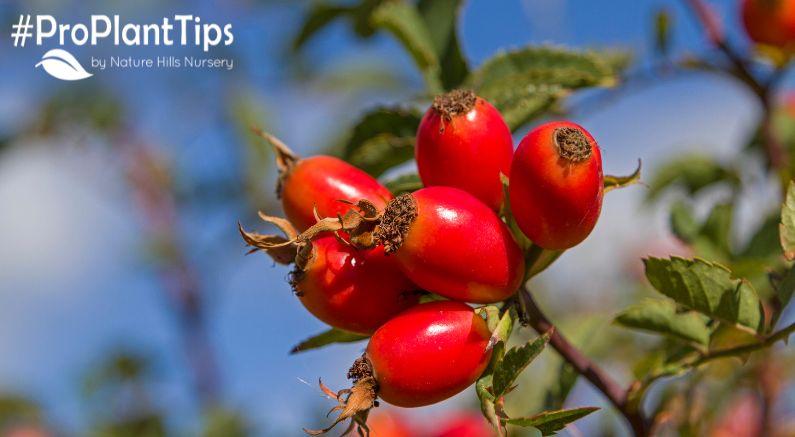Roses are well known for their beauty, long-lasting blooms, and fragrance! Now that Autumn is around the corner - many types of Shrub Roses and Wild Roses are finishing their summer-long bloom and forming colorful seedpods called Rose Hips!
Many gardeners only see them as a colorful last gasp of fall and winter interest, but savvy gardeners and your bird population know you have something so much more!
So should you remove your Rose Hips? Well, that’s a Yes and No!
All About Rose Hips
Sometimes spelled Rosehip, these colorful round seed pods are the fruits that form on many kinds of Rose bushes (Rosa spp.), and especially large and showy on Rugosa Roses! Some of the Rose Hips from wild roses are much smaller and less fleshy but very show still!

When the flowers finish the petals fall off and the fleshy fruit forms and ripens and color ranges from orange, yellow, and red to deep purple. As you can see the Roses starting to go dormant and the leaves are turning color and the Hips have colored up beautifully!
The Hips are the fleshy fruits where the seeds are produced. But there is more to these colorful nuggets than meets the eye!
Health Benefits of Rose Hips
Rose Hips in Food
One delicious reason to remove the Hips is for use in the kitchen! Rose Hips are super high in vitamin C and are used in many kinds of supplements and we’re sure you have heard of Rose Hip tea, jelly, and marmalade! Dry the Hips for later use and keep them in a cool, dry place for later use.

Fresh or dried, you can make a refreshing tea that is high in Vitamin C, A, E, and B, flavonoids, and other antioxidants and minerals. They also contain a substance that fights inflammation and is great for your health and immune system.
The juice of fresh Rose hips can be strained and used immediately, or frozen for up to a year. Fresh or dried Rose Hips can also be cooked to extract the juice for preserves, syrups, and flavoring. Drizzle the syrup over pancakes, or flavor beverages, and even serve over ice cream. The juice can add vitamin C to bone broth, and the hips themselves can be added to flavored vinegar.
For Your Health Inside & Out

The Hips can also be infused and made into Rose Hip oil that is used for a wide variety of beauty products from creams, salves, soaps, and lip balms! Vitamin C is moisturizing and has been shown to promote collagen synthesis and protect skin cells against sun damage. Plus the oil has beta-carotene!
Other Uses For Rose Hips
For the Winter Interest

One reason to keep the Hips on your shrub is that Rose Hips will remain showy all winter long giving you and your garden months of fall and winter interest!
For the Birds
That’s if the songbirds don’t come to pluck them off before then! Typical birds include Thrushes, Blackbirds, Redwings, Green Finches, and Goldfinches that will feed on the Rose Hips during the autumn and winter.
For Bouquets & Décor
Many times Rose Hips are cut and used in holiday decorations and floral bouquets! Indoors or out, add snipped stems of Rose Hips to containers, wreaths and swags, garlands, and potpourri!
Mixed with evergreen branches and stems from Red Twigged Dogwoods, Curly Willow, and Holly, tucked into urns or containers at the front entrances of homes and businesses for the winter months as they are very persistent and remain colorful all winter long!
Beautiful Rosy Hips!
Fantastic beauty and full of healthful benefits for you inside and out, the lovely last gasp of beauty from your Rose bush before the winter! Check out all the gorgeous perks these rosy seed pods have in store for your life and landscape today with the help of Nature Hills!
Happy Planting!


